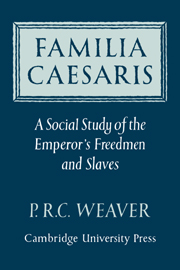2 - Nomina and praenomina
Published online by Cambridge University Press: 07 October 2011
Summary
EARLIER CHRONOLOGICAL LIMITS
An Imperial nomen in itself only gives a fixed earlier chronological limit, or terminus post quem, for an Augusti libertus. Thus, when used in conjunction with the Imperial praenomina, the earliest dates possible for the following are: C. Iulius Aug. l. 27 bc; M. Iulius Aug(ustae) l. ad 14; Ti. Iulius Aug. l. ad 14; Ti. Claudius Aug. lib. 41; Ser. Sulpicius Aug. lib. 68; T. Flavius Aug. lib. 69; M. Cocceius Aug. lib. 96; M. Ulpius Aug. lib. 98: P. Aelius Aug. lib. 117; T. Aelius. Aug. lib. 138; M. Aurelius Aug(g). lib., L. Aurelius Aug(g). lib. 161; L. Septimius Aug. lib. 193, Augg. lib. 197, Auggg. lib. 198. The freedmen of the Aurelii Augusti: M. Aurelius (161–80), Commodus (177–92), Caracalla (197–217), Elagabalus (218–22), Severus Alexander (222–35), all have the same nomen and praenomen, except some with the praenomen ‘L.’ manumitted either by L. Verus or by Commodus at certain periods, probably 177–80 and 190–2. The separate freedmen of these emperors cannot be distinguished by nomenclature alone, except the cases of M. Aurelius Auggg. lib. which are post 198 when Geta became Caesar. It is sometimes possible to distinguish between the freedmen of Augustus and Gaius by means of the forms of the status indication characteristic of the former, e.g. Caesaris l., Caesaris Augusti l. But separation of the freedmen of Claudius and Nero, and those of Vespasian, Titus and Domitian is very difficult in the absence of other dating criteria.
- Type
- Chapter
- Information
- Familia CaesarisA Social Study of the Emperor's Freedmen and Slaves, pp. 24 - 41Publisher: Cambridge University PressPrint publication year: 1972
- 1
- Cited by



